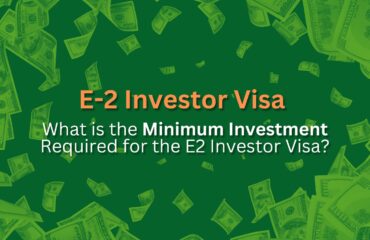
Table of Contents
- What is the E-2 Treaty Investor Visa?
- Understanding the E-2 Visa
- Do You Qualify for the E-2 Investor Visa?
- How Much Money Do You Need to Invest to be Considered a Substantial Investment?
- What is the Application Process for an E-2 Treaty Investor Visa?
- What are the Benefits for an E-2 Visa Holder?
- Frequently Asked Questions About the E-2 Visa
- Conclusion
What is the E-2 Treaty Investor Visa?
Are you a foreign national that is interested in investing into the United States? The E-2 Treaty Investor visa is a type of nonimmigrant visa that offers an opportunity for foreign individuals from certain countries to invest into starting and managing an enterprise in the United States.
Before someone can sider applying for an E-2 visa, it is important to understand that this type of visa demands comprehensive knowledge and meticulous planning. This short guide aims to provide a basic overall understanding of the E-2 visa process, from the intricacies of qualification criteria to the nuances of substantial investment.
Understanding the E-2 Visa
The E-2 visa is not just a pathway for investment; it also plays a significant role in international trade relations and fosters economic growth between the United States and treaty countries. As a nonimmigrant treaty investor visa, the E-2 visa helps in facilitating international investments that contribute to the U.S. economy through the opening of new enterprises and, in turn, help provide jobs and stimulate the economy on a local and even a national scale.
The E-2 investor visa is rooted in treaties of commerce and navigation between the United States and participating countries. These treaties establish the framework for reciprocal investment opportunities, promoting mutual economic interests and strengthening diplomatic ties. By leveraging these treaties, eligible nationals can access the benefits of the E-2 visa, facilitating seamless investment and business operations in the U.S.
CLICK HERE for a full list of the countries that have treaties of commerce and navigation with the United States.

Do You Qualify for the E-2 Investor Visa?
Qualifying for an E-2 visa requires navigating a stringent criteria outlined in the Immigration and Nationality Act (INA) and corresponding regulations (8 CFR § 214.2(e)). Some of the requirements include:
- Treaty Country Eligibility: The foundation of E-2 visa eligibility lies in the applicant’s nationality. Only individuals hailing from countries that maintain treaties of commerce and navigation with the United States are eligible to apply. While the list of treaty countries is extensive, not all nations have treaties, necessitating thorough verification of eligibility based on the applicant’s citizenship.
- Substantial Investment: While there’s no fixed minimum investment amount, the investment must be significant relative to the total cost of purchasing or establishing the investment enterprise. This requirement demonstrates the investor’s commitment to the success and viability of the investment business, ensuring that the investment enterprise contributes meaningfully to the U.S. economy.
- Ownership or Control: The applicant must possess at least 50% ownership of the U.S. enterprise or demonstrate operational control through managerial or supervisory roles.
- Intent to Develop and Direct: Applicants must show an intent to develop and direct the business operations in the U.S., rather than being passive investors.

How Much Money Do You Need to Invest to be Considered a Substantial Investment?
Defining what constitutes a substantial investment is vital in E-2 visa applications. While there’s no fixed minimum investment, the investment must be substantial relative to the total cost of purchasing or establishing the enterprise. In other words, a business that would require a lot of capital to begin operations, such as a full-service restaurant or manufacturing plant, would require a larger investment as opposed to a consulting firm or coffee shop. Factors influencing the determination of a substantial investment include:
Proportionality
The adequacy of an investment is based on its proportionality to the scale and nature of the business enterprise. While larger-scale ventures may necessitate substantial capital infusion, smaller businesses can demonstrate substantiality with comparatively modest investments. The key lies in aligning the investment amount with the specific requirements and growth potential of the enterprise, ensuring that it supports its operational needs.
Job Creation Potential
Investments that create tangible economic benefits, such as job opportunities for U.S. workers, are highly regarded in E-2 visa applications. Applicants are encouraged to provide detailed projections and plans for job creation, demonstrating how their investment enterprise will contribute to creating jobs and economic growth. By highlighting the potential for job creation, applicants strengthen the case for the substantiality of their investment and its positive impact on the U.S. economy.
What is the Application Process for an E-2 Treaty Investor Visa?
Navigating the E-2 visa application process demands meticulous attention to detail and adherence to procedural requirements. Key steps include:
- Creating a Business Plan: A well-crafted business plan serves as a cornerstone of the E-2 visa application, outlining the purpose, objectives, and operational strategies of the investment enterprise. In the context of demonstrating a substantial investment, a comprehensive business plan plays a pivotal role in showcasing the viability and growth potential of the business venture. The business plan should contain a few key sections such as market analysis, financial projections, marketing strategies, and operational plans, providing a roadmap for the successful development and expansion of the enterprise. By articulating a clear vision and strategy for the investment, applicants reinforce the case for the substantiality of their investment and its alignment with the goals of the E-2 visa program.
- Entity Formation: Establishing a U.S. business entity, such as a corporation or limited liability company (LLC), is a prerequisite. The chosen investment enterprise structure should align with the investor’s objectives and legal considerations.
- Documenting the Investment: Compiling comprehensive documentation demonstrating the investment’s legitimacy and substantiality is crucial. Such documents may include bank statements, financial records, purchase agreements, and lease contracts.
- Visa Application Submission: Completing Form DS-160, scheduling a visa interview, and submitting the requisite fees and documentation to the U.S. embassy or consulate in the applicant’s home country.
What are the Benefits for an E-2 Visa Holder?
Securing an E-2 visa provides a number of benefits for investors and their families, including:
- Flexibility: E-2 visa holders enjoy the flexibility of entering and exiting the U.S. to facilitate business operations and international travel.
- Dependent Benefits: Spouses and unmarried children under 21 years old can accompany E-2 visa holders to the U.S. as dependents, with eligible dependents granted work and study privileges.
- Business Expansion: E-2 visa holders have the opportunity to expand and diversify their business ventures in the U.S., leveraging the favorable regulatory environment and market opportunities.
- Long-Term Planning: While the E-2 visa is initially granted for a period of about 2-5 years, E visa renewals are permitted, as long as the E-2 treaty investor maintains eligibility and continues to meet the E visa requirements.
Frequently Asked Questions About the E-2 Visa
Can I bring employees from my home country to work in my U.S. business on an E-2 visa?
Answer: Yes, E-2 visa holders may employ essential employees from their home country to work in their U.S. business. However, such employees must still meet specific eligibility requirements.
Can I invest in any type of business to qualify for an E-2 visa?
Answer: While there’s no restriction on the type of business eligible for E-2 visa investment, the enterprise must be bona fide and meet the requirements of a “real and operating commercial enterprise“. Common investment categories include retail businesses, service industries, technology startups, and manufacturing ventures, to name a few.
Can I apply for permanent residency (green card) while holding an E-2 visa?
Answer: While the E-2 visa itself does not directly lead to permanent residency (green card) status, it can serve as a pathway for investors to pursue immigrant visa options, such as the EB-5 immigrant investor program or employment-based green card categories. Eligibility for permanent residency is contingent upon meeting specific criteria and fulfilling the requirements of the chosen immigrant visa category. See Employment-Based Green Cards.
How soon can I begin operating my business in the U.S. after obtaining an E-2 visa?
Answer: Once the E-2 visa is approved, applicants can begin business operations in the U.S. immediately. However, it’s important to ensure compliance with any state and local business regulations, obtain the necessary licenses and permits, as well as fulfill any other legal requirements related to the specific industry or business.
Conclusion
Mastering the complexities of the E-2 treaty investor visa process demands preparation, planning, and expert guidance. With a thorough understanding of qualification criteria and substantial investment requirements, aspiring foreign investors can navigate the E-2 visa journey with confidence.
Are you ready to invest in the United States? At Ochoa & Hill Law Group, our Houston immigration law firm specializes in immigration legal services assisting entrepreneurs and industry leaders with their business immigration needs, offering expert guidance every step of the way. Contact us today to schedule a consultation to learn more about navigating immigration law and turning your American dreams into reality in the land of opportunity.
Disclaimer: The information provided in this guide is for informational purposes only and should not be construed as legal advice.




